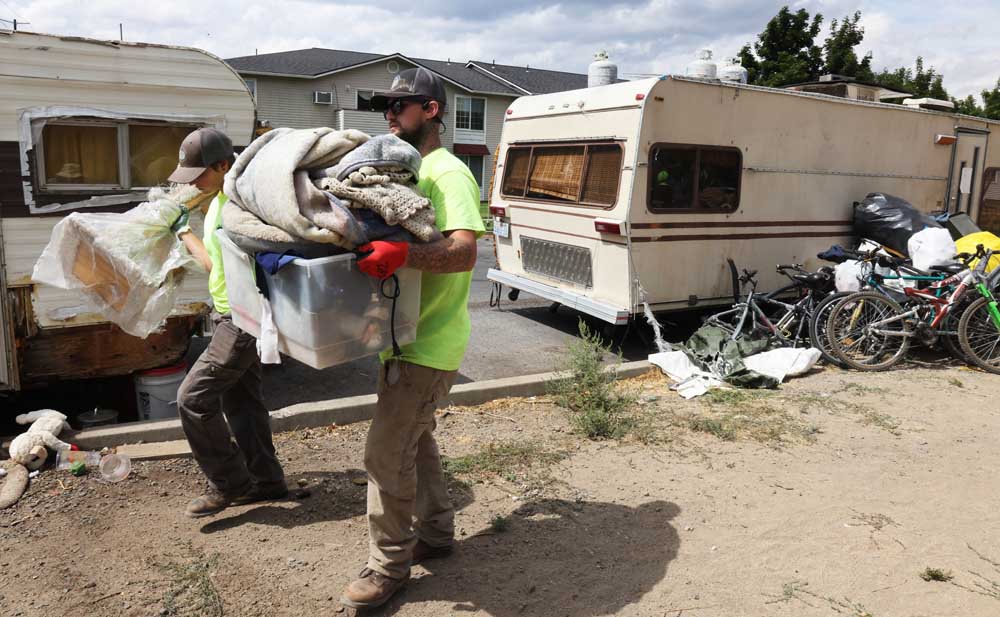Bend cracks down on vehicle campers, looks to tighten rules
Published 1:45 pm Friday, August 23, 2024

- Casse Mallett, left and Tim Saunders, with Central Oregon Bio Solutions, haul away trash from the homeless camp on NE Watt Way in Bend.
Thursday afternoon was like deja vu for Tiffini Prater.
She worked to organize belongings outside her trailer home on Watt Way in Bend, just north of Safeway and Costco, deciding what to keep and what to throw away.
The next day she would have to follow directions to move from the street where she’s lived for a year.
“I’m stressed out,” she said.
Last summer was no different. She used to live parked on Hunnell Road, where dozens of people living in cars and trailers were removed by the city to address public safety issues and make way for construction projects.
City begins cleanup of Hunnell-Clausen and Loco roads, some allowed more time
Prater said she doesn’t know where to go next. She prefers the proximity and safety of Watt Way over larger homeless encampments outside the city limits.
The side road in east Bend has become an increasingly common place to park for people living in their cars, trucks, trailers and RVs. But several people living in their vehicles have left in the past few days, and others, like Prater, are on the way out.
Since adopting a code setting up rules around camping on city rights-of-way in late 2022, the city has been effective at breaking up large, longstanding homeless camps with a prioritization on risks to human health and safety, said city spokesperson René Mitchell.
So far this year, the city has built a set of tools to allow the camping code to be applied to cars, while a proposed code change for tighter restrictions on living in vehicles is working its way to city council.
City staff gave official notification to some Watt Way car campers Aug. 14 they were in violation of the city’s parking code that prohibits parking in a public right-of-way for more than three business days. State law gives people camping in public 72 hours to move after a notice. Some were given extra time to comply due to disability law requirements.
Long process
The recent notices were the zenith in a long process of notifying people on Watt Way about the code and working with them to move, said Sherri Meisel, health and safety officer with the city of Bend. She described the process as “slowly turning up the dimmer switch” with the city’s camping code.
The teeth have sharpened in recent months not because of new code changes, but because of greater city resources: a location to store towed vehicles and coordination with contractors for towing and trash removal.
A cleanup contractor was at Watt Way Thursday afternoon.
Meisel said she and fellow officer Jason Gault have worked hard to help people comply before taking any enforcement action. She said they try to make the process easier by passing out information about the city’s code, maps showing where camping is not allowed and lists of mental health and shelter services.
Meisel said she wishes the list was longer.
“We don’t have any place to tell folks to go to,” she said. “That’s not ideal. People shouldn’t have to survive in the public right of way.”
Meisel said Thursday no vehicles have been towed under this new system. David Abbas, director of the city department responsible for rights-of-way, said Wednesday that towing would be possible by the end of the week for people not in compliance with the order to move.
The city won’t tow if someone is in their vehicle, and owners don’t have to pay to retrieve them, Meisel said. Other cities with similar programs, however, have shared concerns about cost burdens from towing, but the number of vehicles in violation in Bend isn’t high enough for the city to be worried about cost, said Ian Leitheiser, assistant city attorney, said during Wednesday’s council meeting.
Vehicle camping changes
Leitheiser recently presented possible changes to the city’s code on vehicle camping that will appear in an ordinance before the council on Sept. 18. If the changes are adopted, the city would impose the same rules for living in vehicles as for people living in a tent: no dwelling in one place for more than 24 hours, no camping near neighborhoods or homeless shelters and no more than three camps or cars per block.
Leitheiser said the city does not have the intent — or practical ability — to immediately tow every vehicle in violation, but rather to prioritize risks to public safety.
The city has not issued fines or citations for violation of the camping code since it went into effect in March 2023.
Eight months in, Bend’s ‘camping code’ has moved hundreds but cited none
“When I say we are applying and enforcing our code, I mean it, but we are doing it without actually citing anybody,” he said.
Most of the city council gave a preliminary thumbs up for the code changes Wednesday, citing the need to set consistent rules and expectations for sheltering in public places. They opted to move ahead with drafting the ordinance without opening it up for public input since the details of the camping ordinance were already hashed out during that process in 2022.
Councilor Barb Campbell said she did not support the details of the camping code then, and doesn’t support the proposed updates now.
“The change is going to mean we’re more cruel to people who live in vehicles in order to align that with our tent camping code, which is the one that is the more cruel of the two to people who are the most vulnerable in our society,” she said Wednesday.
Editor’s note: This article has been corrected to clarify the nature of risk posed by homeless camps prioritized by the city for removal since 2022.








